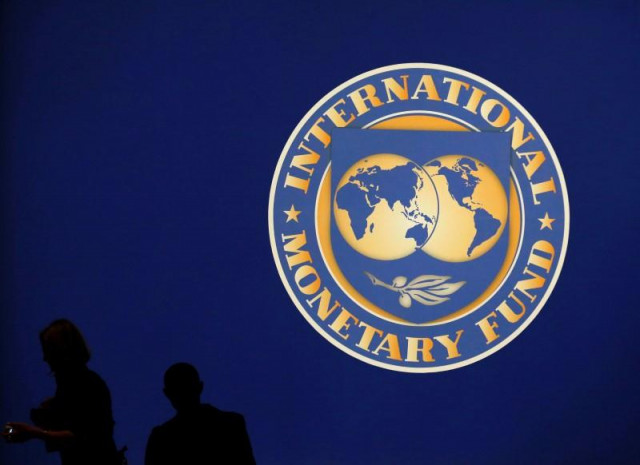Pakistan will get $38 billion to meet financing needs: IMF
Finance adviser says 100,000 non-filers added to tax net with amnesty scheme

PHOTO: REUTERS
Most of these loans will be consumed in repaying the debt piled up by the previous as well as the current political dispensation.
“The approval (of the IMF programme) will unlock from Pakistan's international partners around $38 billion over the programme period," the IMF said in a statement.
The international financial institution also projected a 13% inflation rate at the end of current fiscal year -- which means that the State Bank of Pakistan (SBP) will increase the interest rate to over 15%.
The IMF has not clarified whether the $38 billion borrowings will be sufficient to meet all financing needs of the country during the three-year period.
IMF finally approves $6 billion package for Pakistan
Independent estimates have put the total financing requirements at $55 billion to $60 billion during this period. The amount of $38 billion is inclusive of the $6 billion IMF package.
Giving a break-up of the loans, Adviser to the Prime Minister on Finance Dr Abdul Hafeez Shaikh on Thursday said $14 billion loans would be in the shape of a rollover of the previous loans.
“Pakistan will obtain $8.7 billion project loans, $4.2 billion in budgetary support and another $8 billion will be secured from commercial banks and foreign capital markets,” he said at a news conference at his office.
The macroeconomic table that the IMF released after the approval of the programme shows that by the end of this fiscal year, the public and publically guaranteed debt will peak to 80.5% of the GDP.
In absolute terms, the public and publically guaranteed debt will be nearly Rs36 trillion -- a net addition of Rs11 trillion within two years of the current government.
At the end of 2017-18, the public and publically guaranteed debt was equal to 75.3% of the GDP, according to the IMF statement.
“The debt-to-GDP ratio is increasing because of the repayment of old loans, Minister of State for Revenue Hammad Azhar, who was accompanying the finance adviser, said in response to a question.
Shaikh said during the last fiscal year, the government returned $9.5 billion in loans while debt servicing in the ongoing fiscal had been estimated at $11.8 billion.
He added that the Pakistan Tehreek-e-Insaf (PTI) government had inherited a debt of nearly Rs31 trillion and the economic managers had made several decisions to return these loans -- one of which was approaching the IMF.
There is also a significant increase in the external public debt that is estimated to increase from 24.3% at the end of the Pakistan Muslim League-Nawaz (PML-N) government’s term to 32% of the GDP during first two years of the PTI government’s tenure.
The debt-to-GDP ratio is increasing at a time when the country's debt-bearing capacity is weakening. In 2017-18, the external public and publically guaranteed debt was equal to 209.4% of the total export receipts -- a ratio that is projected to deteriorate further to 234% at the end of this fiscal year.
Shaikh said the IMF programme would help in attracting non-debt creating inflows.
He argued that by entering into an agreement with Pakistan, the IMF had sent a message to the world that the government would exhibit responsibility in controlling its expenditures and mobilise taxes from its wealthy classes.
"We will make difficult decisions and measures will be taken to protect the vulnerable segments of society,” the finance adviser added.
Shaikh noted that the IMF programme was “very important” and international financial institutions would be “satisfied to note that Pakistan has been given a show of support by an institution whose basic objective is to assist its member states at a time when they need help".
Tax amnesty
Briefing the media about the outcome of the tax amnesty scheme, Shaikh said 137,000 people had registered for the tax amnesty scheme and paid nearly Rs70 billion in taxes.
The sum of Rs70 billion is inclusive of the Rs15 billion that will be paid in the ongoing fiscal year by the beneficiaries of the amnesty scheme.
“The beneficiaries of the tax amnesty scheme have whitened assets worth Rs3 trillion and 80% of them were from domestic sources,” Federal Board of Revenue (FBR) Chairman Shabbar Zaidi, who was also present on the occasion, told the media.
Shaikh the number achieved in the amnesty scheme was the highest for any such endeavour in the country’s history and included over 100,000 people who were previously non-filers.
Amnesty scheme draws 100,000 new tax filers, $450m
“The primary objective of the scheme was to raise the number of future taxpayers and allow people to whiten their money,” he added.
“Through the tax amnesty scheme, the number of income tax return filers has jumped to 2.1 million.”
However, the real challenge for the government is to increase the tax collection to Rs5.5 trillion by end of this fiscal year.
The IMF said the adjustment under the programme would be supported by comprehensive efforts to drastically increase revenue mobilisation by 4% to 5% of the GDP at the federal and the provincial levels over the programme period.
The FBR chairman said to facilitate the business community, it had been decided to clear 60% of the imports through the green channel facility and income tax exemption certificates for imports would be promptly provided to industrialists. “These measures will boost business and help increase tax collection,” he added.



















COMMENTS
Comments are moderated and generally will be posted if they are on-topic and not abusive.
For more information, please see our Comments FAQ